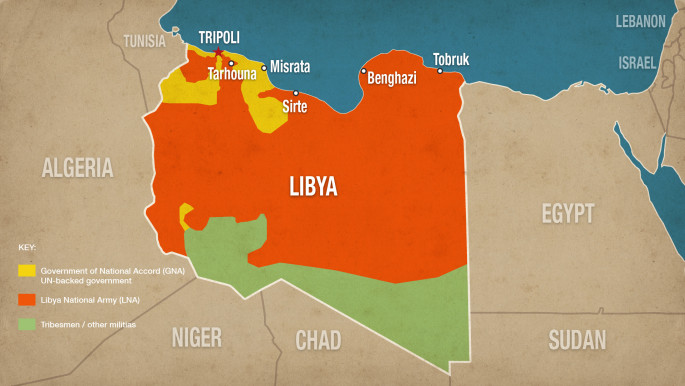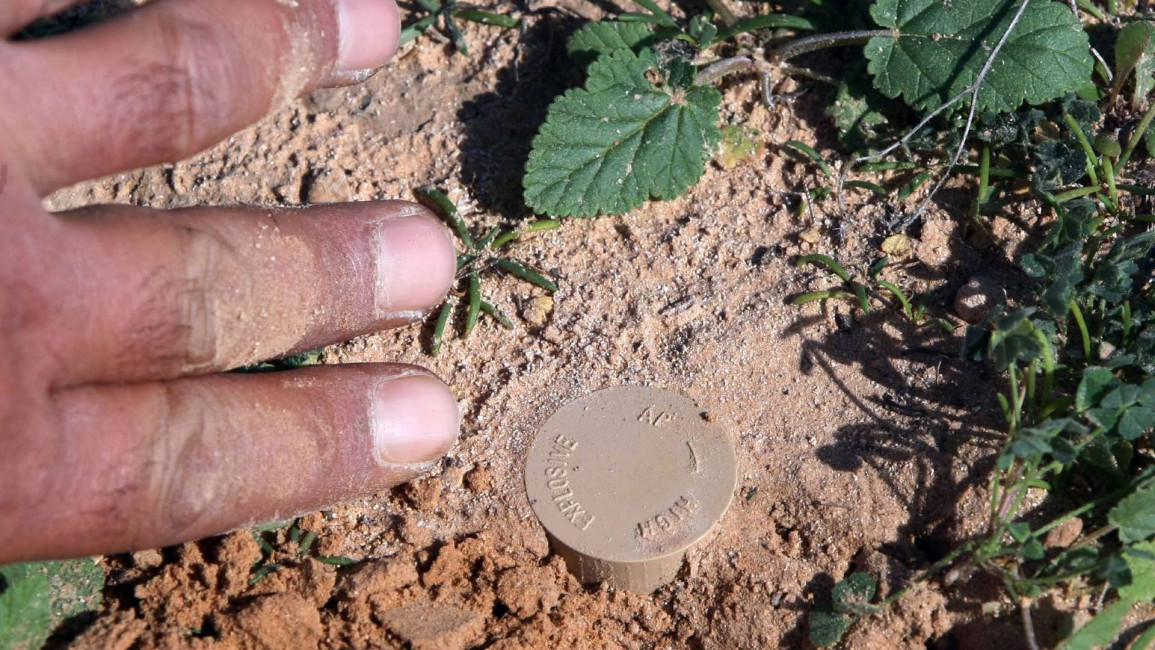UAE-backed Haftar forces laid internationally-banned landmines in Libya, says HRW report
UAE-backed Haftar forces laid internationally-banned landmines in Libya, says HRW report
Pro-Haftar forces retreating from Tripoli last month laid internationally-banned landmines, posing a grave risk to civilians.
3 min read
A landmine discovered during a demining operation in Libya in 2011 [Getty]
The loose confederation of armed militias fighting for Khalifa Haftar in an offensive on Libya's capital are thought to have laid anti-personnel landmines and booby traps, deemed illegal under international law, during their retreat, human rights groups have reported.
Haftar's forces, affiliated fighters and foreign mercenaries left behind landmines capable of seriously wounding or killing multiple people as they retreated from southern parts of Tripoli in May, according to a report by Human Rights Watch said on Wednesday.
Steve Goose, HRW's arms division director and chair of the International Campaign to Ban Landmines, the Nobel Peace Co-Laureate, called the use of internationally-banned landmines "unconscionable".
"Those fighting in Tripoli should halt using landmines and start clearing them to avoid further harm to life and limb," he said.
During the 2011 uprising that overthrew Libya's longtime dictator Muammar Gaddafi, Haftar pledged to never allow forces under his command - dubbed the Libyan National Army [LNA] - to use landmines, as they do not distinguish between fighters and civilians.
Haftar must "publicly renew this pledge and instruct fighters under his command and foreign fighters supporting the [LNA] to stop using landmines and destroy any stocks in their possession", Human Rights Watch said.
HRW cites reports of at least two fatalities among residents in Tripoli's Ain Zara and Salahuddin districts in May from improvised explosive devices placed both in-and-around their homes.
Zakaria Al-Jamal was killed by an while checking his family’s home in Salahuddin on 22 May, according to a relative.
Meanwhile Muhammad Daleh was killed his brother seriously injured when they attempted to dismantle explosive devices in Tripoli.
Several days later, forces aligned to the UN-backed Government of National Accord (GNA) posted images on Twitter of four types of Russian-manufactured anti-personnel landmines in several Tripoli neighbourhoods, claiming they were laid by mercenaries belonging to the Kremlin-linked Wagner group.
Other footage showed mines connected to trip-wires and other victim-activated explosive devices, which are prohibited by the Mine Ban Treaty.
Haftar's forces have been waging an offensive to oust the Tripoli-based and UN-backed government from the capital since April 2019, killing over a thousand people and displacing tens of thousands more.
Despite receiving backing from Russia, UAE, Saudi Arabia and other countries - as well as hundreds of mercenary fighters - Haftar's side has suffered a series of setbacks in recent months, pushing them back from Tripoli's outskirts.
The Gaddafi regime stockpiled millions of landmines in storage facilities which were left abandoned in 2011, and subsequently fell into the hands of anti-government fighters and civilians.
However, the anti-personnel mines found in Tripoli last month are Soviet and Russian-made models which were not previously known to be in Libya, and have likely entered the country recently.
Since the Second World War, landmines and other explosive remnants have caused at least 3,252 casualties in Libya, according to Landmine Monitor.
"This latest landmine use is adding to Libya's already considerable burden of uncleared mines, abandoned ordnance, unexploded ordnance, and danger for Libyans for years to come," Goose said.

Follow us on Facebook, Twitter and Instagram to stay connected
Steve Goose, HRW's arms division director and chair of the International Campaign to Ban Landmines, the Nobel Peace Co-Laureate, called the use of internationally-banned landmines "unconscionable".
"Those fighting in Tripoli should halt using landmines and start clearing them to avoid further harm to life and limb," he said.
During the 2011 uprising that overthrew Libya's longtime dictator Muammar Gaddafi, Haftar pledged to never allow forces under his command - dubbed the Libyan National Army [LNA] - to use landmines, as they do not distinguish between fighters and civilians.
Twitter Post
|
Haftar must "publicly renew this pledge and instruct fighters under his command and foreign fighters supporting the [LNA] to stop using landmines and destroy any stocks in their possession", Human Rights Watch said.
HRW cites reports of at least two fatalities among residents in Tripoli's Ain Zara and Salahuddin districts in May from improvised explosive devices placed both in-and-around their homes.
Zakaria Al-Jamal was killed by an while checking his family’s home in Salahuddin on 22 May, according to a relative.
Meanwhile Muhammad Daleh was killed his brother seriously injured when they attempted to dismantle explosive devices in Tripoli.
Several days later, forces aligned to the UN-backed Government of National Accord (GNA) posted images on Twitter of four types of Russian-manufactured anti-personnel landmines in several Tripoli neighbourhoods, claiming they were laid by mercenaries belonging to the Kremlin-linked Wagner group.
Other footage showed mines connected to trip-wires and other victim-activated explosive devices, which are prohibited by the Mine Ban Treaty.
Haftar's forces have been waging an offensive to oust the Tripoli-based and UN-backed government from the capital since April 2019, killing over a thousand people and displacing tens of thousands more.
Despite receiving backing from Russia, UAE, Saudi Arabia and other countries - as well as hundreds of mercenary fighters - Haftar's side has suffered a series of setbacks in recent months, pushing them back from Tripoli's outskirts.
The Gaddafi regime stockpiled millions of landmines in storage facilities which were left abandoned in 2011, and subsequently fell into the hands of anti-government fighters and civilians.
However, the anti-personnel mines found in Tripoli last month are Soviet and Russian-made models which were not previously known to be in Libya, and have likely entered the country recently.
Since the Second World War, landmines and other explosive remnants have caused at least 3,252 casualties in Libya, according to Landmine Monitor.
"This latest landmine use is adding to Libya's already considerable burden of uncleared mines, abandoned ordnance, unexploded ordnance, and danger for Libyans for years to come," Goose said.

Follow us on Facebook, Twitter and Instagram to stay connected


![President Pezeshkian has denounced Israel's attacks on Lebanon [Getty]](/sites/default/files/styles/image_684x385/public/2173482924.jpeg?h=a5f2f23a&itok=q3evVtko)



 Follow the Middle East's top stories in English at The New Arab on Google News
Follow the Middle East's top stories in English at The New Arab on Google News


